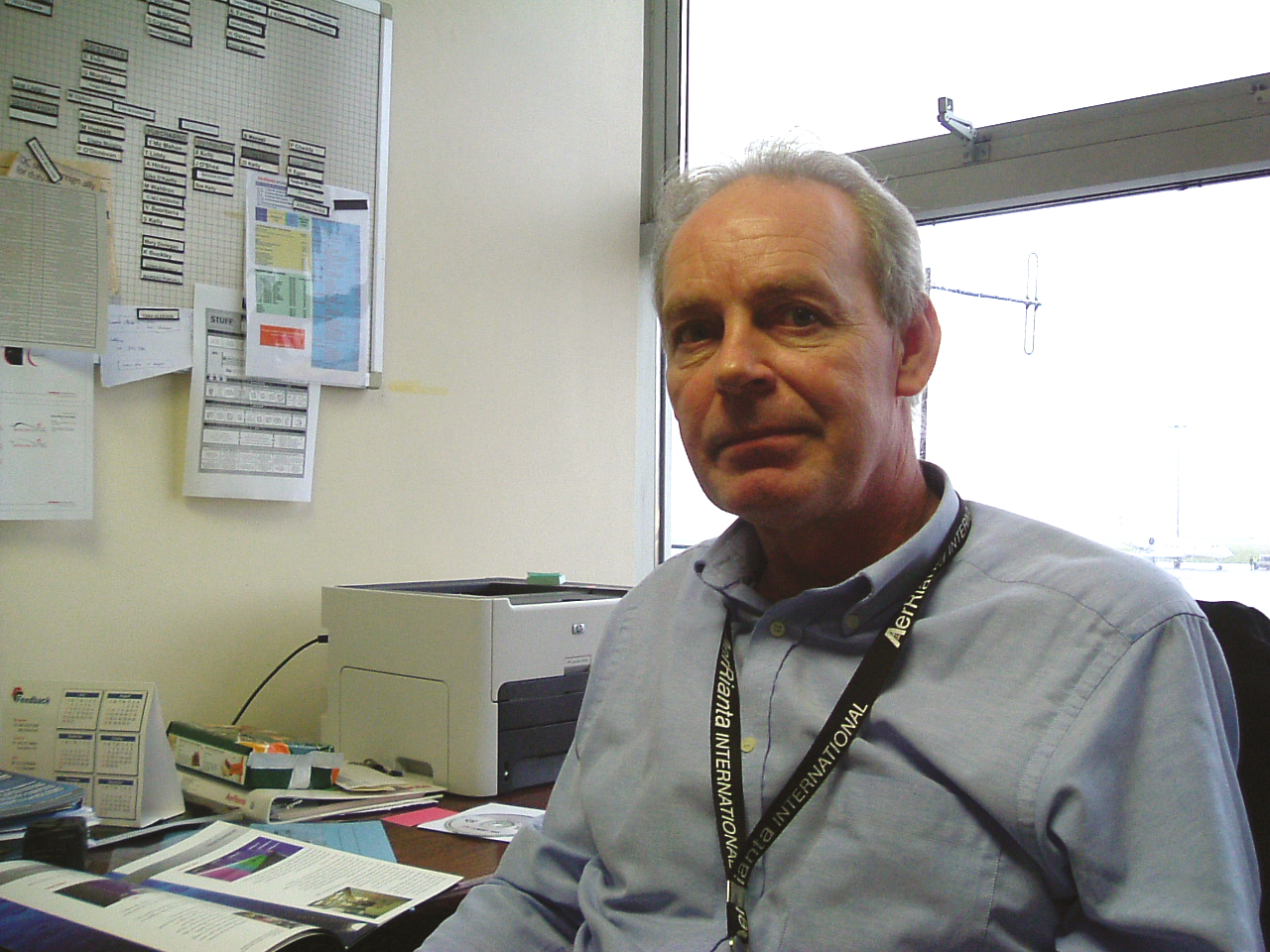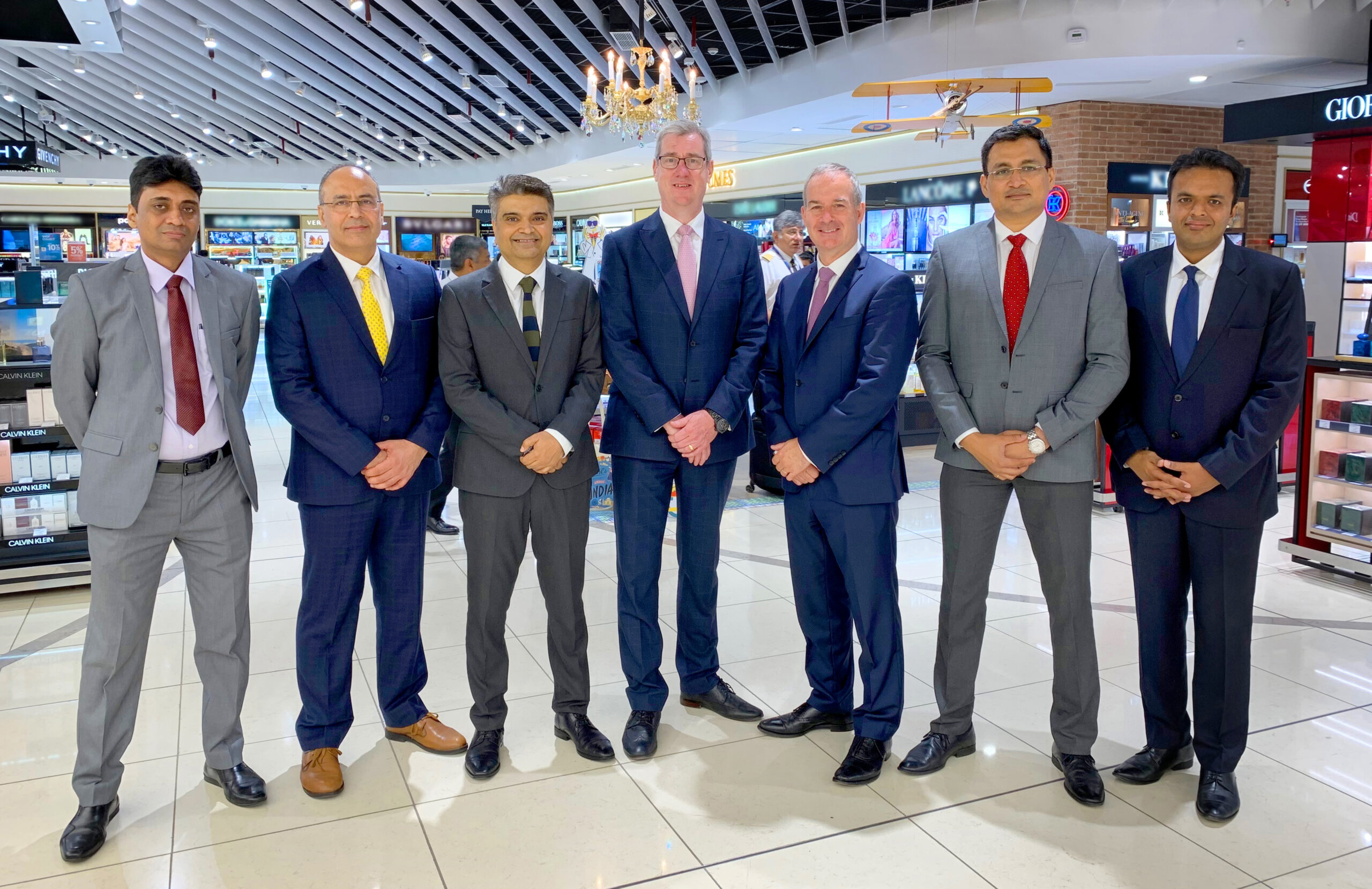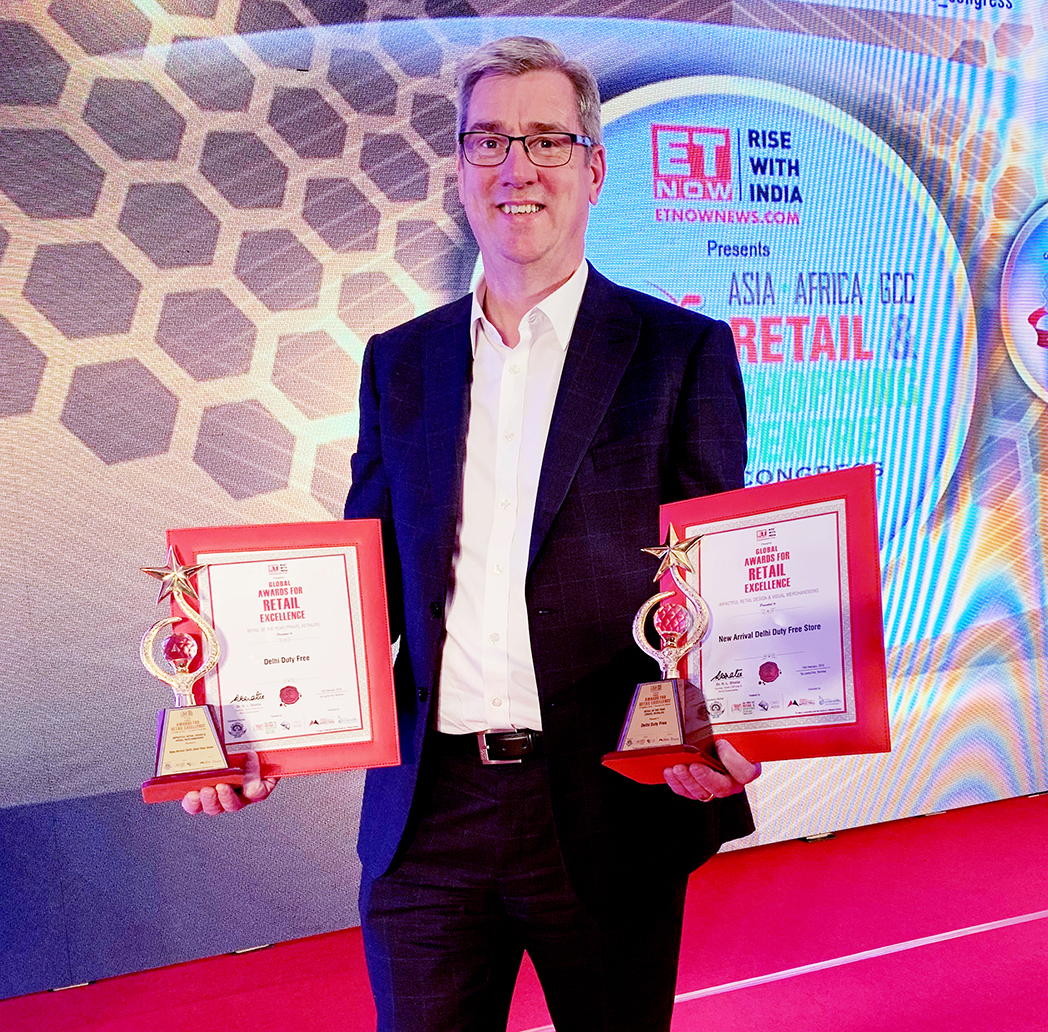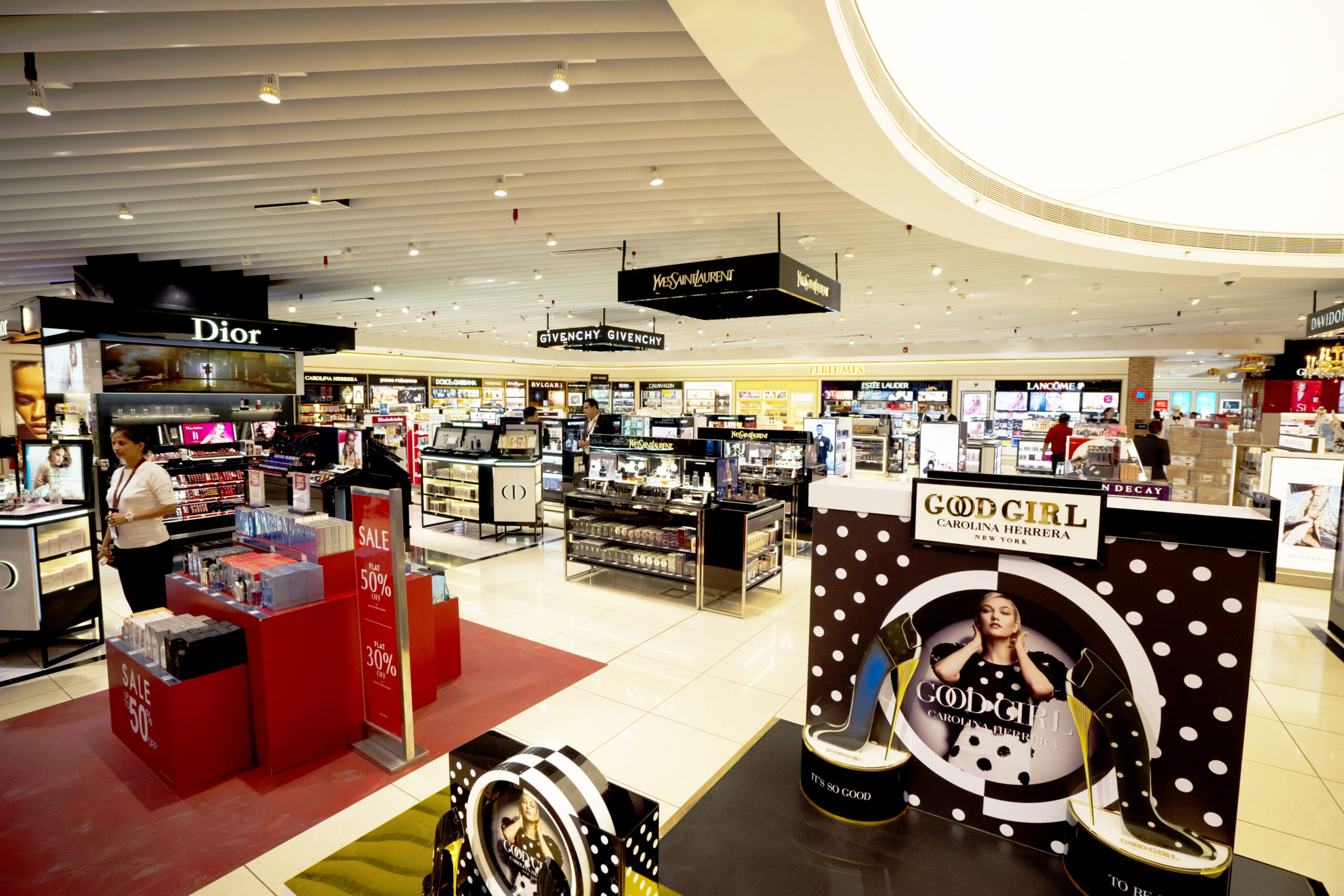Editor’s Introduction: Philip Eckles, who has announced his plan to step down as Delhi Duty Free CEO at year end, has played his own part in pioneering travel retail’s evolution over the past 30 years, and has seen some of the industry’s seismic changes close up.
He began work in the industry for Allders International in 1989, at London Heathrow Terminal 4, before a career-changing move to Aer Rianta International (ARI) in 1993. From that point Eckles was a member of ARI teams that travelled the world setting up fledgling duty free businesses, notably in eastern Europe. He also helped to run the Eurotunnel duty free business, at one point the biggest in the world, before intra-EU duty free abolition in 1999.

He oversaw ARI’s expansion to new territories in North America, led its Middle East business and over the past two years in his latest role, helped Delhi Duty Free accelerate its growth until COVID-19 hit. Eckles has worked through crises from 9/11 to SARS to the current COVID-19 pandemic, the impact of which he reflects upon in the interview below.
He talks about life as an ex-pat, the cast of colourful characters he has met along the way, becoming an adopted Irishman and why travel retail can still count on a prosperous future if it remains true to its core values.
Dermot Davitt: Philip, tell us please what prompted your decision to step down at year end? Is it something you’ve been reflecting on for a while?
Philip Eckles: I had been considering a move home when this role originally came up in 2018 but becoming CEO at Delhi Duty Free was a big opportunity. It meant that I was once more looking after a retail business, which is my background anyway, and it’s also a great business. I was looking to move home in the next year or two, but what hastened that was COVID-19.
When you are isolated somewhere in the world, and you cannot visit your family for quite a long time, and they are isolated too, it puts things in perspective. If anything happened to family there, or to me here, we could not travel to see each other. It wasn’t fair on them and I just felt that the priorities were not right.
COVID-19 forced an awakening. It brought home to me that now should be the time. By the time I leave we will hopefully have built Delhi Duty Free up again after the restart and things will be looking more positive.
The decision, I should stress, was not to do with work. I love it here. It was about my own personal circumstances, which I needed to give more thought to than perhaps I have in recent years.
Philip Eckles introduces the new-look Delhi Duty Free stores in this special video from 2019
So you are making a permanent move back to the UK?
I said I would be home for Christmas and that is the plan. I don’t have any plans beyond that. Of course I might do something else in the industry in the future but I don’t see that being another ex-pat role.
We all talk about retiring early to be physically able to do all the things you want to do. I’m 55 now and I’m healthy, so at what point do you decide ‘now is the time’?
I have worked hard and have been in this business for 31 years. I’m fortunate that I can afford to go home and take it easy, without a firm agenda for a while, and that’s exactly what I’m doing.
You are rounding off this chapter of your career in the most senior executive role at Delhi Duty Free, a business that until this crisis was growing at pace. How do you see the potential there and indeed of the wider Indian market longer term?
To take the current impact first, we started to feel the effects of COVID-19 at the end of January and it grew and grew. At one point in mid-February 50% of our arrivals traffic wasn’t allowed into the store due to restrictions and screening of inbound flights from different places. With 60% of our business coming from arrivals, that was significant.
Despite all of the challenges we still finished the year [to March] +12% ahead of the year before. So sales were up and passenger numbers were down. That was partly due to the impact of the new arrivals and departures stores, where we have increased penetration and average transaction levels.
India is still on the ascent, even given the bump in the road that we are seeing now. If you look at ACI forecast numbers, they have singled out India as a country with huge potential. Once recovery does come, India, Delhi and Delhi Duty Free will see the benefits compared to other places.
Since I have been here the business has grown every year and the future is only positive. Business will return and Indians love their duty free, and especially their brown spirits. Things have been distressing in the past four months but we should remind ourselves that we can repeat what we did in the past and this business will be a roaring success once more.
To wind back to the beginning then, how did you come to be involved in travel retail?
I had worked in UK high street retail and in 1989 was looking for a new role when I came across an advert in the London Evening Standard for a Duty Manager for Allders International at Heathrow Airport.
I didn’t get the job – in fact I lost out to a far more qualified candidate in Emma Franklin [who went on to be a senior executive at Alpha Retail, The Nuance Group and ARI -Ed]. The General Manager who interviewed me was Adrian Donovan [who became a senior operations executive for ARI -Ed] and Bill Maxwell [later General Manager at Moscow Duty Free and Regional General Manager – Retail at ARI] was there too.
Adrian knew where I was working in the domestic market and I remember him commenting positively on the retail standards there. So he recommended me for a different, more junior role, as Department Manager at Allders. I joined to manage the Electronics and Photographic business at Heathrow T4 and stayed for four years, during which I held various roles, including Merchandise Manager.
It was a time of the real awakening of commercialism at airports, something we take for granted nowadays.

And it was through your connection with Adrian and Bill that you made the move to ARI…
Yes, they had both moved to ARI by 1993, Adrian to a new role at Moscow Sheremetyevo. Bill recruited me to help Adrian run the retail there but things turned out a little differently than planned.
I was at ARI headquarters in Shannon Airport doing my induction in preparation for my role, with David Hope [a pioneering figure in ARI who had been the first General Manager at Moscow Duty Free in 1988 -Ed] and the HR Manager. It was about three days before I left.
They were asking about my preparations, and I said I had all the right clothes and gear for the cold weather. And David said: “What do you mean? It’s very hot in Karachi.”
It turned out there had been a change of thought about where to deploy me but they hadn’t actually told me yet. So on 30 May 1993, I flew to Karachi to help run that operation for ARI. As some people have told me, I haven’t really travelled that far in travel retail. I started off in Pakistan and ended up in India.
Yes but not before you made your way across multiple geographies with ARI…
That’s right. I had only done a year away, and my wife was at home with our one-year-old daughter, when ARI were looking for someone to go to Folkestone in the UK after they won the contract for Eurotunnel. In fact Andrew Baker, who now heads ARI’s business in Cyprus as General Manager, just sent me a message reminding me that he did the handover of the shop to me as Retail Manager back in 1994. I spent a couple of years there, working again with Adrian, which was a very enjoyable time.
I must have done something right because after a couple of years ARI asked me to head up the operation in Kiev. I was there about two years until late 1998 and another opportunity arose back in the UK, after ARI bought an equity stake in Birmingham Airport. I went there to help develop the commercial and duty free business.
In fact that period of about a year was the only time I lived at home in my ARI career. It ran until just before the abolition of intra-EU duty free in 1999 and also took in a further period at Eurotunnel, helping to wind that business down after abolition. It wasn’t an auspicious period in industry history; that decision put a full stop to the Eurotunnel business as it stood then, when it was the biggest single duty free operation in the world I believe.

Did you head further afield after that?
I was in Sofia for about five years on another project for ARI, and then the opportunity arose to head up the growing North American region out of Montreal, and that was a thoroughly enjoyable period. I oversaw the Canadian operations across multiple airports, but it also coincided with the start of a new business at New York JFK [in partnership with Sardana -Ed], where Bart Collins was our General Manager. Plus we later began an operation in Barbados in 2007, which continues to this day.
In 2010, we had the retirement of one of ARI’s great figures and characters, John Sutcliffe, from his role as Managing Director of ARI-Middle East. I was delighted to be offered the chance to step in and lead that business from Bahrain. Later, in March 2015, we had the restructure of the executive team at ARI, when I was named Global Implementation Director. That ran through until August 2018. I then moved on and came to Delhi Duty Free where I am today.

That time spans many roles and many different experiences. It must have been fascinating to work at ARI at a time when that company was a pioneering force in so many territories?
It absolutely was. My time at ARI began not long after the collapse of the Soviet Union and there was a real awakening in all of the countries in that region about the opportunities. I was grateful for the welcome and support of people like Vladimir Sai, our Director General at Kievrianta, one of many great characters I met along the way. They were great times.
What other highlights stand out for you across the period?
To be involved in such a fantastic business as Eurotunnel and figure out how to keep up with the volume was memorable, even up to the week it closed.
For me also, getting my first GM role in a fast developing market such as Ukraine was exciting. ARI gave a lot of autonomy to their GMs which was welcome and compared very favourably with my time at Heathrow for instance, where the business was very centralised. You had scope for decision making and the freedom to operate.
I thoroughly enjoyed my time in North America too, which was and remains a great business. And to win the Frontier Award for Airport Retailer of the Year in 2010 was a great accolade for the team’s hard work there.

But what really stands out is all the great people I’ve been lucky enough to work with. The impact of Ireland on the industry has been immense over many years. You and Martin wrote the book on that influence, The World Rovers. I consider myself an adopted Rover, having worked for ARI for such a long time. I’m fortunately to have met so many great characters along the way and to have created memories that will last forever.
Who were the biggest influences on your career over that time?
Adrian Donovan had an unswerving attention to high retail standards and retail fundamentals. He and then Bill Maxwell instilled and consistently demanded those standards at all times. That influenced me greatly and that is something I have maintained throughout my career.
Once I had been in ARI a couple of years Eamon Foley took over as Director General/CEO from his role as CFO. From that point on he was very influential in the way my career developed from the GM position in Kiev to the consultancy roles in Birmingham and Sofia, the Regional Director position for ARI in North America and then CEO of ARI-Middle East.
Even in my most recent move as CEO of Delhi Duty Free I have had the pleasure of maintaining this long-term working relationship as Eamon remains a Director at Delhi Duty Free. He has been a constant throughout my duty free career and has been more than generous with his support and guidance over the past 25 years.

Has the industry changed in many fundamental ways in the time since you joined it? Do you think we need to see more reform in the way relationships are managed and contracts are struck? Might this crisis be a catalyst for that if so?
I’d like to think we will see change but I’m a bit sceptical. I know we have many conversations around the Trinity, led by Martin and you at The Moodie Davitt Report, but some people have paid lip service to the idea of closer, real partnership. Maybe this is the catalyst though to make contracts more realistic.
Airports will still require the funding that rental guarantees offer. I hope it changes the way relationships work. There will be short-term agreements in place to get past this crisis, but competition will be there in two, three, four years’ time, so what will that mean for the decisions airports take or the agreements they strike? I hope we see more reality intrude.
The duty free business has changed a lot but some fundamentals have not. It’s still broadly about a luxury offer at a great price, in a superb environment with what I think is the best customer service you’ll find anywhere in the world. The right product, price, environment and service remain as true now as they did 30 years ago. We should remember that. If we do we will still be here to have those conversations about store formats, new ways to sell, the role of technology, the online offer and so on.
Putting all the contractual matters that go with our business aside, retailing is not complicated, but we need to ensure that we do everything that we can to deliver the best retail experience for our customers – every time. I learned to always ask: is this the best that we can do? If you can honestly answer yes, then great. If not, do it again.

You have worked through other crises, from 9/11 to SARS. Do you think this is one we will take longer to bounce back from?
The biggest change is not in what we do or how we behave, but in how passengers behave. It will take a while for their confidence to return. It will happen though we don’t know when or how that will look until they fly again. Here in Delhi we have proved we can engage the traveller well, and I’m confident we’ll do it again.
The days of heading off to virgin markets to open up duty free shops where none existed are in the past now. I wonder if many people appreciate what it took to begin and build a business, something that ARI and others did so well in the 1990s?
With globalisation happening at such pace over the past 20 years there are no undiscovered markets now. ARI was so successful at finding new locations, their people were prepared to travel and importantly they took the expertise with them. Now that expertise exists in most markets you go to today so it’s not necessary to bring in ex-pat managers.
Also, one of our major roles when we went overseas was to train local people to do the job so they could take over. You will still need expertise for your business in new markets but I think the requirement to send ex-pats will diminish.
Communication has also obviously changed. When I was leaving Pakistan I was handed a phone bill for US$5,000. Now of course it’s pretty much free to call via Skype, WhatsApp or whatever. The technology moves along and changes how you live and work. Our team at Delhi Duty Free is all signed up for the Moodie Davitt Virtual Travel Retail Expo, where we will meet our industry partners this year.
Nonetheless, even with better communications, as an ex-pat you are away from home and that takes a toll. You ran a webinar with Eamon Foley a few weeks about the stresses of running a business in isolated locations and it shone a light on the difficulties of doing that. It’s not easy.

Finally, what will the next chapter hold for you and family? Are there some long-held dreams you want to fulfil?
One of course is to spend more time with my wife Sarah; my kids are grown up but I can be part of their lives in different ways. As an ex-pat also, you don’t spend much time in your own home, doing things that you would do if it was your permanent home.
Two is to work on the golf handicap so I can play a round with you, Dermot, without embarrassing myself.
Three, I’ll be watching West Ham United as a season ticket holder, though I hope that is in the Premier League, and not the Championship after this season.
There are many other things I want to do, including travelling that does not involve work. In the past holidays tended to be about going home to the UK. There are many positives to being an ex-pat and I have lived in many wonderful places, but the skiing trip in February or other holidays you might like to undertake doesn’t figure very highly on the agenda when you are always away.
I don’t plan on taking a new role but you never know, maybe six months on I’ll want to get involved in something else. I have loved working in this industry and if I do come back to work I don’t see it being anywhere but in duty free.














